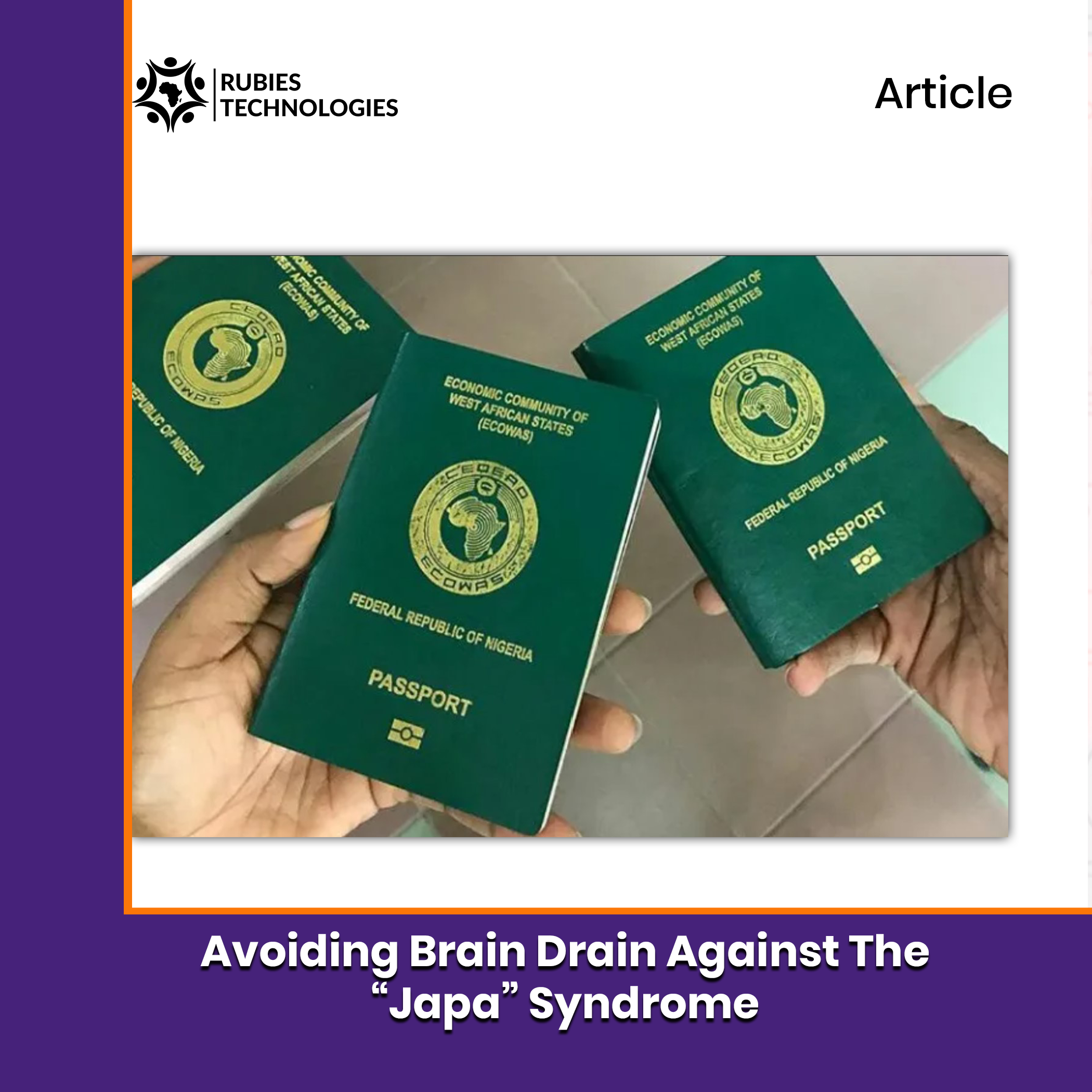Introduction
Japa started as a playful word in the local Nigerian communities when youngsters – in their thousands, started to leave the country to seek greener pastures abroad. It simply means run away or escape in Yoruba language and many young Nigerians are doing just that in the thousands, leaving the country in search of a better life abroad.
Although it is a sort of comical expression, but it has also evolved into a more serious national talking point ahead of this coming general elections.
While this may sound funny, it has caused the country in numerous ways and would take years for the gaps left by the japa population to be filled. From the economy, to the educational sector, and even the private sector, almost all spheres of work ecosystem in Nigeria have had a taste of the effects of this increasing brain drain.
According to statista, the migration rate in Nigeria stood at -0.29 per 1,000 population in 2021. Trust that figure to skyrocket in 2022. This means that the number of people leaving Nigeria is slightly higher than that of those entering the country. Between 2000 and 2021, the migration balance stayed negative. The exodus of young, talented Nigerians to other countries in search of better opportunities has caused a significant loss of human capital in various sectors of the country.
This week at Rubies Technologies, we shall explore the root causes of brain drain in Nigeria, as well as potential solutions to prevent it from happening in the future.
Root Causes
One of the major reasons for brain drain in Nigeria is the lack of job opportunities for young people. The unemployment rate in Nigeria is quite high, and this has led many young graduates to seek greener pastures elsewhere. The lack of access to quality education and training is another factor that has contributed to the brain drain problem. Many young Nigerians do not have access to the necessary education and training needed to secure good jobs in the country.
Another factor that has contributed to brain drain in Nigeria is the poor working conditions in many sectors of the economy. Many young people are not willing to work in conditions that are not conducive to their personal and professional growth. In addition, corruption and nepotism have made it difficult for talented individuals to advance in their careers.
Now, let us look at the effect of brain drain on the various sectors;
On the Nigerian economy:
Nigerian is known to be fully stacked with creatives, unfortunately, the emigration of professionals in their fields will no doubt impede the economic growth of the country. Yearly, millions of highly trained experts relocate abroad and the loss of skilled human resources continues to proliferate.
On the Nigerian Job market
Mass resignation of skilled labour forces across the country for greener pastures abroad is a major threat to the development of society and the country as a whole. Nairametrics stated that many companies suffered loss of their workers the most in July with majority of them being in sales and marketing department. The core operations section followed suit in second position.
A research conducted by LEADERSHIP NG revealed that the banking industry were at the receiving end of the japa syndrome the most to an extent that it was discussed as an issue at the Bankers’ Committee meeting held in April 2022.
Findings from their research revealed that about 500 software engineers in 2022 secured better offers abroad – majorly in Canada and European countries, where the emolument far outweighs what they are being paid in the Nigerian banking sector as they are paid in foreign currency at a time the nation’s Naira has seriously depreciated.
Also, about 1,000 other staff were recorded to have left their jobs in banks for juicier offers abroad, and from clear indications more will follow in their steps.
Things aren’t much different in the ICT sector too. Many tech developers are either leaving the country in search of better paying ICT jobs or working remotely for foreign companies.
The good side
Despite the grave consequences of people leaving the country now and then, we cannot shy away from the little benefits that comes with it. Remittance inflow for instance is one of the benefits of the japa syndrome.
Because Nigeria has a large citizen base in the foreign countries, her remittance inflow has always been the largest in Sub-saharan Africa.
Solutions
To prevent brain drain in Nigeria, the government and other stakeholders need to take action to address the root causes of the problem. Here are some potential solutions:
Increase Job Opportunities: The Nigerian government should create more job opportunities for young people, particularly in sectors that require skilled labor. This will help to retain young, talented individuals in the country.
Improve Education and Training: The government should invest in the education and training of young Nigerians. This will help to improve the skills and knowledge of young people and make them more competitive in the job market.
Enhance Working Conditions: The government and private sector should work together to improve working conditions in various sectors of the economy. This includes providing better salaries, benefits, and working environments that are conducive to professional growth.
Tackle Corruption and Nepotism: The government should take action to tackle corruption and nepotism in various sectors of the economy. This will help to create a level playing field for all individuals, regardless of their social or economic status.
Provide Incentives for Skilled Professionals: The government should provide incentives for skilled professionals to remain in the country. This could include tax breaks, grants, and other financial incentives to encourage professionals to stay in Nigeria.
Conclusion
Preventing brain drain in Nigeria requires a concerted effort not only from the government but from private sectors, and other stakeholders.
Employers in the private sector understand that hiring to replace a worker costs more and takes longer than retaining an old one, even if the salary of old worker would be slightly increased. The private sectors can also provide job opportunities, invest in education and training, and support innovation and entrepreneurship. Civil society can advocate for policies and reforms that promote talent retention and provide support to young people in Nigeria.
Moreover, it is important to create a culture of excellence and meritocracy in Nigeria. This means that individuals should be rewarded based on their skills and performance rather than their connections and social status. Creating a levelled playing field and providing equal opportunities for all individuals can go a long way in retaining talent in the country.
By taking action to address the root causes of brain drain and creating a culture of excellence and meritocracy, Nigeria can retain its young, talented individuals and build a brighter future for the country.
Written by Abdulateef Badmus



